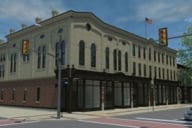You have /5 articles left.
Sign up for a free account or log in.
For all of our talk about the college’s carbon footprint, we at Alma have lately been discussing the many ways in which even a small college impacts the local community and environment. Some of the most exciting work I have done 18 months into my work at Alma College has been in collaboration with our local communities. I am still learning about the exciting work of building and nurturing community partnerships which will be key to the college's future as well as that of our town and region.
As the new year begins, our small community -- Alma, Michigan -- has much for which we can be thankful. Unemployment is down, both in our community and in our deeply challenged state. Business is growing in the downtown, which has long struggled with the growth of strip malls and the arrival of the large retail super stores. Within view of town, the largest wind farm in Michigan is rising up, slowly building to what will be, by this summer, 133 monuments to the new economy. The effort by community leaders -- and guided in part by Alma professors -- to address environmental challenges caused by a chemical company that left the area decades ago are making meaningful progress.
All this good news is especially welcome in Alma, where we have had more than our share of tragedies recently. Eighteen months ago, our town was rocked by the loss of four community leaders when their plane went down in Lake Michigan. Just a few months later, a ruinous fire all but destroyed a prominent landmark at the center of our downtown, Alma's former Opera House. In such a close knit community, nearly every citizen felt the impact.
A classic Midwestern small town of 10,000 (in a county of just 40,000), Alma has weathered difficult challenges before, and thrived. But the loss of automobile subsidiaries and energy companies nearly two decades ago hit our town especially hard. Like many other areas of Michigan, the last census reflected population decline. Younger people increasingly left the area, concerned that there could be no lasting financial stability in a community facing such challenges. And yet, the values and benefits of living in a college town still appeal to many.
Given this context, a key question in the college's planning effort was how we can leverage our presence to ensure that we will thrive together with our community. We have made quick work: last summer we purchased a vacant building and moved our bookstore off campus and across the street into a location that formerly represented a geographic divide between town and gown. We partnered  with Stucchi's -- the successful ice cream store that was destroyed in the Opera House fire -- and brought them in under the same roof. Our new business is thriving so far, a welcome addition to the downtown where students and community members come together.
with Stucchi's -- the successful ice cream store that was destroyed in the Opera House fire -- and brought them in under the same roof. Our new business is thriving so far, a welcome addition to the downtown where students and community members come together.
Better still, an investor bought the burned Opera House and is planning to renovate it into attractive apartments for Alma’s upper level students and young professionals in the community and for retail space that is sorely needed. We are confident that such work will continue the revival of the downtown as well as fulfilling housing needs as the college grows.
Our ambitions are greater still, as we hope to place a large number of interns across Mid-Michigan in an effort to help non-profits and governmental entities that have lost so many resources in the current downturn. We believe such work will be hugely beneficial to Alma students even as it will help to sustain the small communities across our region. Our students can learn how to leave positive footprints in Alma and wherever they go in the future.
I hadn't envisioned such work two years ago, but it's a natural for me, as the product of a small college in a small town myself.
For all of us at the college, reaching out to our community is a part of our mission. This work will help model what de Tocqueville called the “habits of the human heart” that we hope all our students will embrace by the time they graduate.


